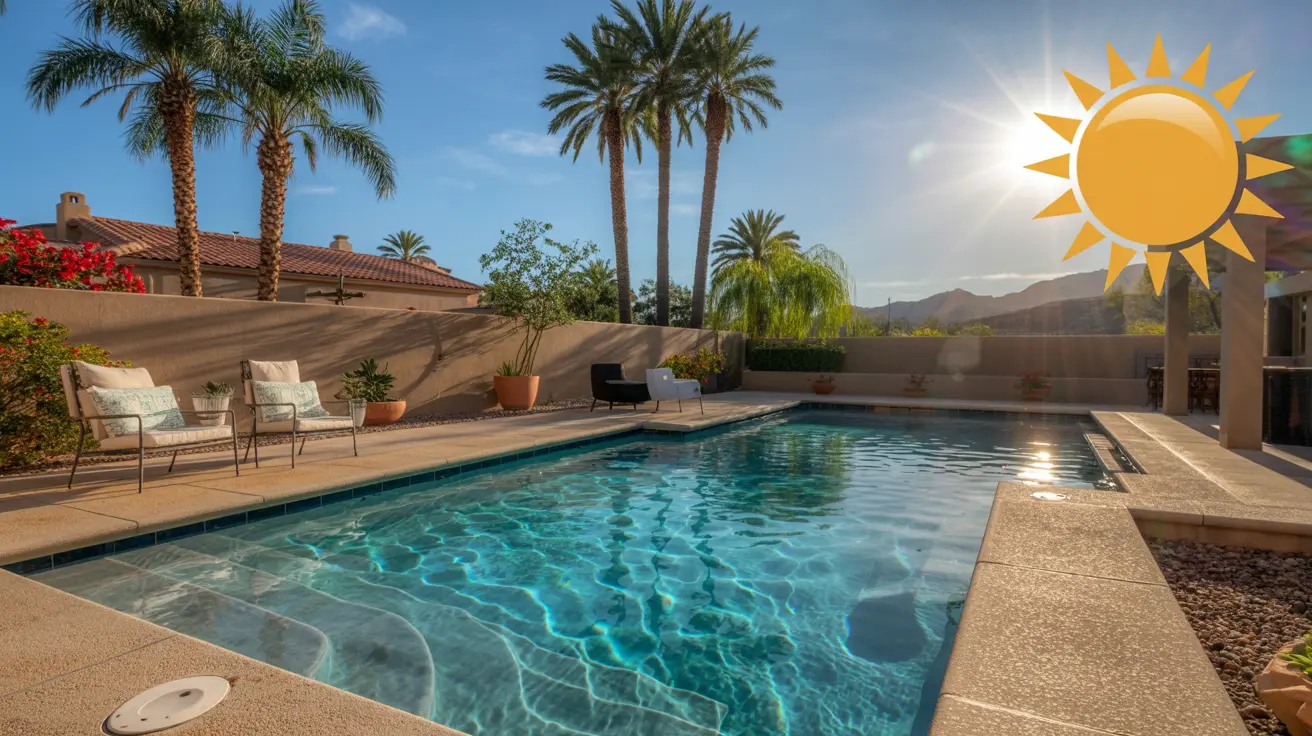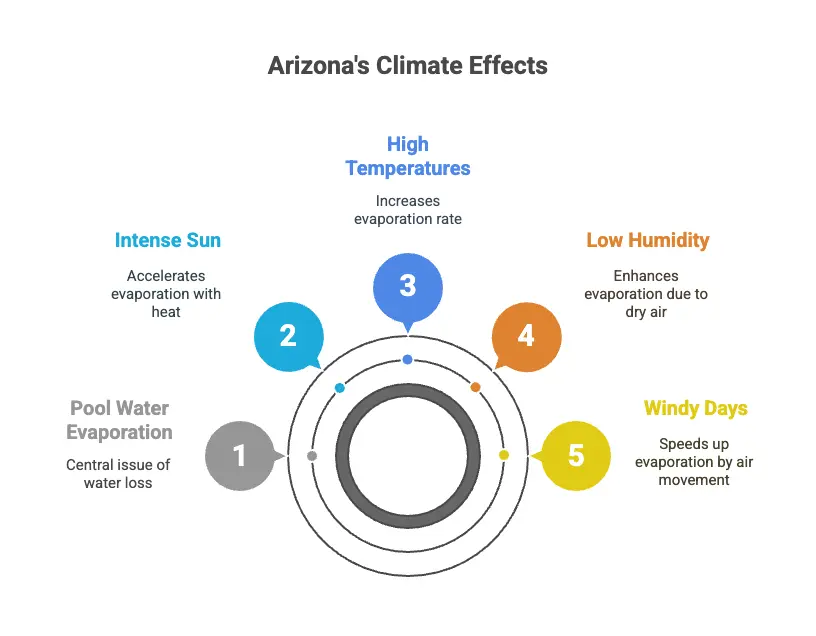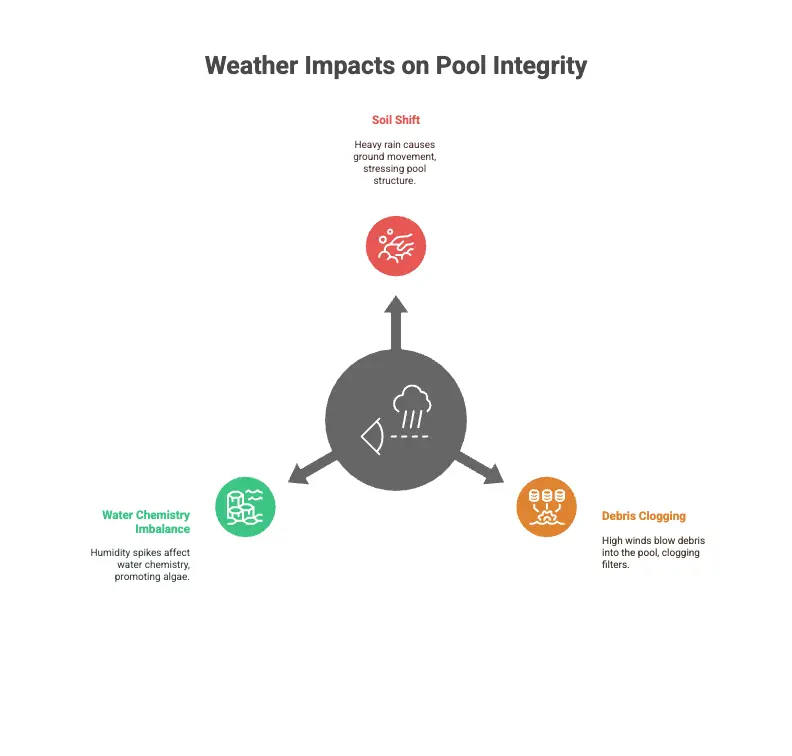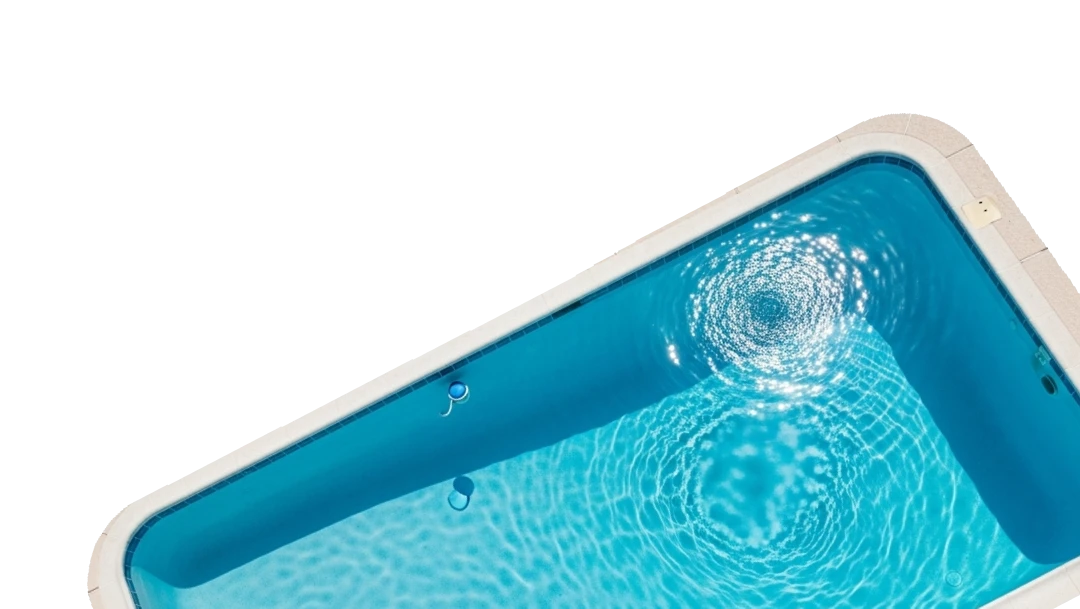How Weather and Seasons Affect Pool Leaks

Arizona’s unique climate brings blistering summers, dry winters, and dramatic temperature swings—all of which can impact your swimming pool’s health. For pool owners, understanding how weather and seasons affect pool leaks is essential for protecting your investment and avoiding costly repairs. At Optimal Pool Leak Detection, we use Leaktronics’ industry-leading leak detection equipment to help you differentiate between normal water evaporation and a true pool leak. This guide explains what to watch for, how to test for leaks, and why seasonal pool care is the key to a leak-free swimming pool.
How Do Weather and Seasons Cause Water Loss in Pools?
Weather has a direct impact on your pool’s water level. In Arizona, hot sunny days, low humidity, and strong winds all contribute to higher rates of pool water evaporation. During summer, your pool may lose up to 2 inches of water per week just from evaporation. In winter, dry air and low humidity can also draw moisture from your pool—even when temperatures are cool. These seasonal changes mean pool owners must keep a close eye on water levels all year long.
What’s the Difference Between Evaporation and a Pool Leak?
Evaporation is a natural process where water turns into vapor and escapes from the pool’s surface, especially during hot, dry, or windy weather. A pool leak, on the other hand, means water is escaping from somewhere it shouldn’t—such as a crack in the pool shell, a faulty pipe, or around pool equipment. The key difference is that evaporation is expected and varies with the weather, while a leak is an abnormal, often hidden, source of water loss that needs repair.
How Does Arizona’s Climate Affect Your Pool Water Level?
Arizona’s intense sun, high temperatures, and low humidity accelerate pool water evaporation, especially in the summer months. Windy days increase evaporation by moving air across the pool’s surface, drawing water away faster. In winter, lower humidity can still cause significant water loss, even if the air is cooler. Without regular rainfall to replenish lost water, pool owners in Arizona must frequently monitor and refill their pools to maintain the correct water level.

Why Is the Bucket Test Essential for Leak Detection?
The bucket test is a simple, reliable way to tell if your pool is losing water due to evaporation or a leak. Here’s how to do it:
- Fill a bucket with pool water and place it on a pool step, ensuring the water inside matches the pool’s water level.
- Mark the water level inside the bucket and on the pool wall.
- After 24 hours, compare the two levels. If the pool water drops more than the bucket, you may have a leak.
This test helps you avoid unnecessary repairs by confirming whether water loss is normal or a sign of trouble.
What Are the Signs That Weather Is Causing a Leak?
While evaporation is natural, certain signs suggest a true pool leak:
- Water level drops more than 1/4 inch per day, even in mild weather.
- Wet spots, puddles, or soft ground around the pool area.
- Algae growth or increased chemical use despite regular pool maintenance.
- Cracks in the pool surface, tiles, or pool deck.
- Unexplained spikes in your water bill.
If you notice these, especially after extreme weather, it’s time for a pool inspection.
How Do Temperature Swings Impact Pool Structure?
Arizona’s hot days and cool nights can cause expansion and contraction in pool materials. Over time, this stress may lead to cracks in the pool shell, separation at joints, or damage to pool plumbing. Winter freezes—even rare in Arizona—can cause pipes or pool surfaces to contract, sometimes creating leaks that only appear when temperatures rise again. Regular inspections help catch these issues early.
Can Rain, Wind, and Humidity Lead to Pool Leaks?
Heavy rain can saturate the ground around your pool, causing the soil to shift and putting pressure on the pool structure or plumbing. High winds increase evaporation and can blow debris into the pool, clogging filters and stressing equipment. Low humidity accelerates evaporation, while sudden humidity spikes can affect water chemistry and promote algae growth. All these weather conditions affect your pool and can contribute to leaks if not managed properly.

How Does a Pool Cover Help Prevent Water Loss?
A pool cover is one of the best tools for reducing evaporation and protecting your pool from the elements. Covers keep heat in during cool nights, block the sun’s rays during the day, and prevent debris from entering the pool. Using a cover can cut evaporation by up to 95%, saving thousands of gallons of water each season and reducing the risk of pool leaks caused by fluctuating water levels.
Why Is Regular Pool Maintenance Important in Every Season?
Seasonal pool maintenance is essential for leak prevention and early detection. Regularly inspect your pool for cracks, worn fittings, or damaged equipment. Clean skimmers and filters, check for leaks around the pool pump and plumbing, and monitor chemical levels to prevent corrosion or scale buildup. By maintaining your pool year-round, you reduce the risk of weather-related leaks and keep your pool running smoothly.
When Should You Call for Professional Leak Detection?
If you’ve performed the bucket test and suspect a leak, or if you notice persistent water loss, unusual wet spots, or cracks, it’s time to call Optimal Pool Leak Detection. Our technicians use Leaktronics’ advanced leak detection equipment to pinpoint the source of leaks—whether in the pool structure, plumbing, or equipment. Professional leak detection saves water, prevents further damage, and ensures your pool is safe for every season.
Key Takeaways: How Weather and Seasons Affect Pool Leaks
- Arizona’s hot, dry climate accelerates pool water evaporation, especially in summer.
- Use the bucket test to distinguish between natural evaporation and a true pool leak.
- Look for signs like rapid water loss, wet spots, or cracks after extreme weather.
- Pool covers and regular maintenance help reduce evaporation and prevent leaks.
- Temperature swings, rain, and wind can all impact pool structure and water level.
- If you suspect a leak, trust Optimal Pool Leak Detection for fast, accurate service with Leaktronics equipment.
Stay ahead of seasonal pool leaks—monitor your water level, maintain your pool, and call the experts for leak detection and repair when needed.
Other ARTICLES

.webp)
.webp)
Pool Leak Solutions For You
Protect Your Pool Investment.
Claim Your Free Quote Now!






